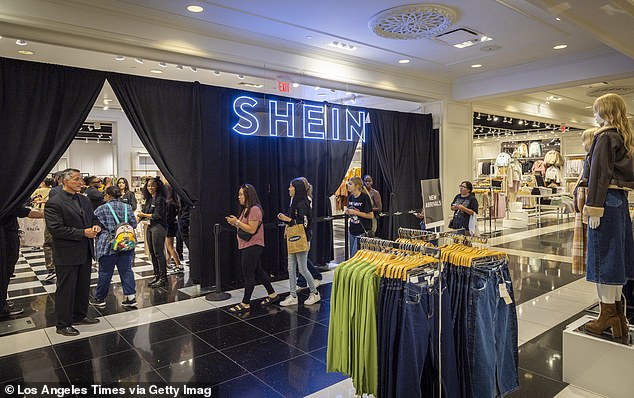Mall fixture fashion chain sparks fears of mass store closures as it mulls bankruptcy
Forever 21, the go-to store for American teenagers for decades, is weighing up bankruptcy as it battles huge debts.
It is just five years since the chain - with 500 stores, including 380 in the US - emerged from its last Chapter 11 filing used to restructure.
The brand was rescued from liquidation in 2020 when mall operators Simon Property Group and Brookfield Corporation partnered with Authentic Brands Group to acquire it.
However, Forever 21 has since struggled to compete with ultra-low-cost online retailers like Shein and Temu.
This time around, Forever 21 has enlisted restructuring firm BRG to work out how it can cut costs, which can include closing stores and renegotiating rents.
It is also searching for a potential buyer to avoid bankruptcy, one source told the Wall Street Journal, which first reported the news.
A bankruptcy filing could put Forever 21 at risk of liquidation, a fate that has claimed several struggling retailers in recent years.
Last year, the company struck a deal with Shein to sell merchandise on its platform, but the partnership has delivered only modest results, Authentic Brands CEO Jamie Salter said at a conference.

Forever 21 is renegotiating the leases for its some 380 stores in the US as commercial rents soar across the country
In January, Forever 21’s parent company, SPARC merged retailers including Aéropostale, Lucky Brand, and Brooks Brothers with JCPenney—but notably left Forever 21 out of the deal.
A company spokesperson confirmed it is exploring strategic options and working toward the best outcome.
Last summer, Forever 21 asked landlords to cut its rent by as much as 50 percent in some areas.
At its peak in 2015, Forever 21 was worth $6 billion, making its married South Korean founders Do Won Chang and Jin Sook Chang supremely wealthy.
Forever 21 is facing a series of problems that have been plaguing profitability for years.
These include increased competition from physical store rivals as well as online-only upstarts, problems making sure it got its stock levels right and losing touch with what shoppers want.
Shops like H&M and Zara, also common in American malls, used to be Forever 21's main competition in the fast fashion sector.
All three use a business model that involves rapidly producing trendy, cheap clothing - and selling it fast.

A line of shoppers get the first opportunity to shop on the opening day of fast fashion e-commerce giant Shein, which hosted a pop up inside Forever 21 at the Ontario Mills Mall in Ontario on October 19, 2023

Temu is another Chinese-based e-commerce retailer that sells clothes at ultra-cheap prices. It, along with Shein, have emerged as Forever 21's main competitors

Pictured: Forever 21's flagship location in Times Square, Manhattan. It spans 90,000 square feet and has four floors

Authentic Brands CEO Jamie Salter, pictured, said that acquiring Forever 21 was 'probably the biggest mistake' of his career. He added that he failed to see Shein and Temu as serious competitors and by the time he recognized the threat they posed, the damage was already done
But in recent years, a new category of ultra-fast-fashion brands like Shein and Temu have left Forever 21 in the dust.
They don't have the massive disadvantage of costly physical locations and can get trendy outfits sold at lightning speed through viral social media posts.
'As soon as someone goes viral in a new outfit on TikTok, Shein is immediately making it and no regular brand can keep up with that,' a person familiar with Forever 21's thinking told CNBC last summer.
'The speed is almost impossible to compete with. So if you juxtapose any brand that was around 20 years ago to these new, on-demand manufacturing fast-fashion companies … it’s like comparing a mobile phone from 2000 to the newest iPhone. The speed, the quality, everything is just different,' the person added.
Forever 21 has scaled down since filing for bankruptcy in 2019 when it had over 800 locations globally.
The crown jewel of the brand's frenzied scaling up was its 90,000 square foot flagship store in Times Square, which opened in 2010. It's unclear if this location will be affected as the company continues to weigh its options going forward.
After its bankruptcy, Forever 21 tried to stop the bleeding by closing hundreds of stores, but its still massive brick-and-mortar footprint is being hammering by soaring rent costs.


